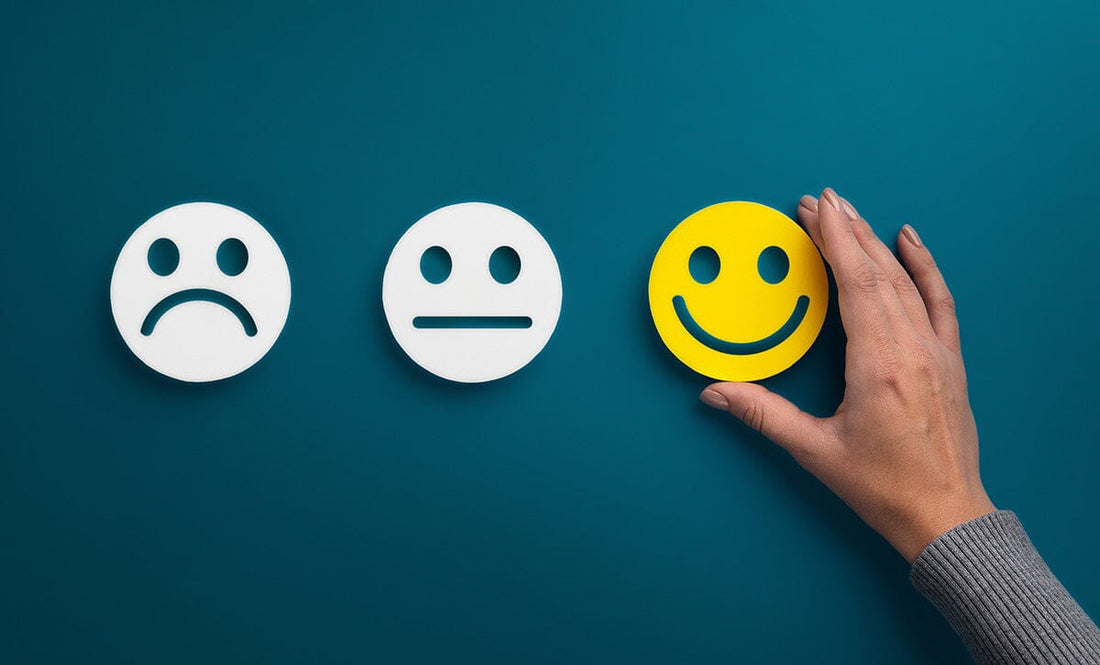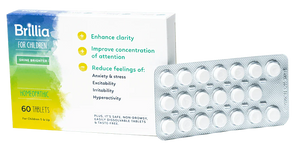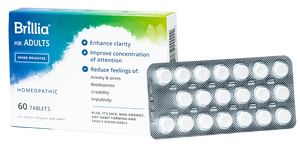When a person with anxiety seeks help from their doctor, chances are they’ll be prescribed anti-anxiety medication. This might be an SSRI like Lexapro or Prozac, or a short-term benzodiazepine like Xanax or Valium. While these medications can be helpful for many, they do not cure anxiety. Instead, they work by suppressing symptoms, some at the cost of other side effects that may be harmful in the long-term, such as drug addiction and dependency.
What many don’t know is that there are a number of behavioral changes you can make to dramatically reduce anxiety with or without medication. At Brillia, we promote a holistic approach, which uses medication as a means to control symptoms while instilling healthy habits like following a nutritious diet and getting adequate sleep. As such habits become second nature, you’ll eventually need less of a medication because you will be empowered to face anxiety triggers safely and effectively on your own.
Read on to find out what precautions should be taken when starting anti-anxiety medication and what non-addictive options are available. And explore Brillia’s holistic 5-Pillar plan, which combines medication with healthy lifestyle habits for long-term success.
Signs of Anxiety in Teens & Adults
Before you can figure out how to best treat your anxiety, it’s helpful to know what it looks like. The American Psychological Association describes anxiety as an emotion characterized by feelings of tension, worried thoughts, and physical changes like increased blood pressure.1 Though occasional anxiety is a normal part of life, when a person feels excessively and persistently anxious, these feelings can interfere with their daily life and potentially cause long-term health problems. Persistent anxiety may also be a sign of an anxiety disorder.
In teens, anxiety might look like this:
- Low self-esteem
- Extreme mood swings
- Trouble sleeping
- Poor academic performance
- Social withdrawal
- Sudden weight gain or weight loss
- Panic attacks
In adults, anxiety symptoms include:
- Feeling excessively nervous, tense, or restless
- Having a sense of impending doom
- Trouble concentrating
- Physical sensations like sweating, shallow breathing and increased heart rate
- Trouble sleeping
- Gastrointestinal issues
- Avoiding situations that trigger anxiety
- Irritability
- Being easily fatigued
Knowing When It’s Time to Try Medication
While medication can be highly effective for some, it is not the only solution. Even prescription medication does not solve the underlying issues from which anxiety stems; these drugs only help to control the symptoms.
There are numerous studies that show the effectiveness of healthy lifestyle choices and relaxation techniques when it comes to reducing anxiety long-term. For instance, according to Harvard, a diet rich in whole grains, vegetables, and fruits can help support a healthy gut, which is important since a large percentage of our serotonin receptors are found in the lining of the gut.2 Serotonin is a crucial chemical for increasing mood and decreasing anxiety and is often targeted in prescription anti-anxiety drugs.
There is also evidence that proper sleep can help protect against anxiety. Studies show that a sleepless night could raise anxiety levels by as much as 30 percent.3
Talking to a counselor or therapist about your anxiety can also make a world of difference. Studies show that cognitive behavioral therapy (CBT) may be as effective or more effective than other forms of psychological therapy or psychiatric medications.4
If you make lifestyle adjustments and still find that you need support, or if you are too depleted by anxiety to even consider such adjustments, you may be a good candidate for anti-anxiety medication. But keep in mind that there are numerous options when it comes to such medications, including non-prescription medication.
Are Most Anxiety Medications Addictive?
Doctors do not typically consider SSRIs like Lexapro or Prozac or SNRIs like Cymbalta or Pristiq to be addictive because they do not cause a euphoric rush like some other drugs. However, if a tolerance is built with continued use, the dose of these drugs will need to increase over time. The physical dependence of these drugs is also evidenced in their documented withdrawal symptoms.5
Withdrawal symptoms include:
- Increased anxiety
- Insomnia or nightmares
- Headaches
- Dizziness
- Tiredness
- Irritability
- Flu-like symptoms
- Nausea
- “Brain zaps” or electric shock sensations in the head
When it comes to benzodiazepines like Xanax, Valium, and Klonopin, addiction is highly possible. From 2005 to 2015, prescriptions for benzodiazepines increased by 50 percent and continue to rise.6
According to Dr. Sumit Agarwal, an internist, primary care physician and researcher at Brigham and Women's Hospital in Boston who authored a study on outpatient benzodiazepine prescriptions, told NPR, “I don't think people realize that benzodiazepines share many of the same characteristics of opioids.”7 In addition to confirming their addictive quality, he said, “They cause you to have slower breathing; they cause you to be altered in terms of mental status. And then, eventually, [they] can cause overdose and deaths.” In fact, studies have illustrated a steep rise in mortality rates from overdoses involving benzodiazepines — from 0.6 in 100,000 people in 1999 to 4.4 in 2016.8
Finding Non-Addictive & Effective Anxiety Medication
In addition to talk therapy and implementing healthy lifestyle habits like following a nutritious diet, getting adequate sleep, and practicing mindfulness, there are a number of non-addictive anxiety medications to consider. Read on to find out how they work.
SSRIs
As stated above, SSRIs are not considered to be addictive medications by doctors, though it is possible to build up a tolerance. These medications work by increasing levels of the neurotransmitter serotonin in the brain. This neurotransmitter plays a significant role in mood regulation, as well as sleeping, eating, and digesting. SSRIs were originally intended to treat depression, but they also have a high success rate in treating people with anxiety disorders.9 However, it’s important to note that some users experience side effects associated with these drugs, which persist or worsen over time, especially when dosages are increased to maintain efficacy. These side effects include loss of appetite, headaches, dizziness, and sexual dysfunction.
Brillia
Suitable for children as young as five, teenagers, and adults,Brillia is a non-prescription homeopathic medication clinically proven to reduce anxiety symptoms without harsh, synthetic chemicals or harmful side effects. Its active ingredient consists of antibodies to the brain-specific S100 protein (S100B), an important regulator of various different intracellular and extracellular brain processes. By regulating the S100B protein in the body, the medication effectively helps to reduce symptoms from occurring in the body without affecting any other systems in the body or masking the personality in any way. As a result of this regulating effect, the levels of feel-good neurotransmitters like dopamine, norepinephrine, and serotonin also normalize, which are the same chemicals SSRIs and SNRIs are designed to target.
Unlike many prescription drugs, Brillia’s dosage doesn't need to be increased over time to be effective as the body will not build up a tolerance to the medication. You can start or stop at any time without having to adjust to the medication or deal with withdrawal symptoms. Even more, Brillia does not have contraindications; the medication can be taken in addition to any prescription drugs or supplements without any adverse effects. Brillia will also not cause drowsiness, lethargy or depression, nor will it affect appetite or cause any weight changes. There is no “coming off” of Brillia should you decide to stop or take a break as it does not alter blood chemistry.
Learn more about how Brillia works.
SNRIs
Like SSRIs, SNRIs were originally intended to treat depression, but they are also effective at reducing anxiety symptoms. Also like SSRIs, SNRIs increase levels of serotonin in the brain as well as norepinephrine, a neurotransmitter which plays a crucial role in your body’s “fight-or-flight” response. Normalizing these neurotransmitters help to improve mood, reduce anxiety symptoms and potentially help alleviate panic attacks.10 According to some research, SNRIs may work best when combined with therapy.11 Though they are not addictive, it is possible to build up a tolerance to SNRIs over time. Some may also be sensitive to side effects of SNRIs, which include headache, lack of appetite, nausea, and muscle twitching.
Hydroxyzine
Hydroxyzine is a common antihistamine medication used to treat anxiety. Unlike other antihistamines, it affects both histamine and serotonin, producing a somewhat sedating effect. Hydroxyzine is a fast-acting medication; most people will start to feel it working within 30 minutes and will feel its maximum effects at around 2 hours.12 In one 3-month study, researchers found that hydroxyzine was a safe and effective alternative treatment to benzodiazepines without risk of addiction.13 Beyond its sedating effects, side effects that may occur include dry mouth, constipation, and headache.
Buspirone
Buspirone is an anti-anxiety medication that also targets serotonin receptors. It is primarily used to treat generalized anxiety disorder (GAD) and is FDA approved for the short-term relief of anxiety symptoms. Unlike benzodiazepines and barbiturates, which target GABA receptors, there is no risk of physical dependence or withdrawal with buspirone use.14 Side effects that may occur include dizziness, nausea, fatigue, and lightheadedness.
Beta-Blockers
Beta-blockers are typically prescribed to treat heart conditions, but they are also commonly used to also treat anxiety. This is because beta-blockers dampen the physical symptoms of the fight or flight response, such as a racing heart and trembling.15 Not intended for long-term use, beta-blockers can be useful when taken before triggering events like a public speech or flight. They are non-addictive, and in rare cases may cause side effects like headache, insomnia and unpleasant dreams.
Seeking Additional Diagnosis & Treatment from Professionals
At Brillia, we know that there’s no one-size-fits-all approach to managing anxiety. Talking to a doctor about different treatments can help you devise a plan that works best for you. While prescription medication may be the right path for you or your child, it’s not the only one. We suggest starting with gentler options first to avoid potential side effects and dependency. In addition to non-addictive medication, this may include talk therapy, mindfulness, nutritional changes, lifestyle changes, and more.
Find out more about how Brillia works and explore more resources on reducing anxiety through lifestyle adjustments at the Brillia(nce) Resource Center.
Get a whole bunch of support right in your inbox.







